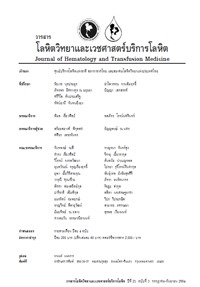การศึกษาความชุกของการตรวจพบแอนติบอดีต่อหมู่เลือดระบบอื่นๆ ที่ไม่ใช่หมู่เลือดในระบบเอบีโอ ในหญิงฝากครรภ์ของโรงพยาบาลตากสิน
คำสำคัญ:
หญิงฝากครรภ์, แอนติบอดีต่อหมู่เลือดอื่นที่มีความสำคัญทางคลินิก, Pregnant women, Unexpected antibody, Hemolytic disease of the newborn (HDN)บทคัดย่อ
บทคัดย่อ
การศึกษานี้มีวัตถุประสงค์เพื่อดูสถิติความชุกในการตรวจพบ unexpected antibody ในหญิงฝากครรภ์ ซึ่งในการตั้งครรภ์นั้นมารดาสามารถสร้างแอนติบอดีที่มีความจำเพาะและมีความสำคัญทางคลินิก ต่อเม็ดเลือดแดงของทารก ซึ่งอาจก่อให้เกิดภาวะ hemolytic disease of the newborn (HDN) ในการศึกษาครั้งนี้เป็นการศึกษาย้อนหลังโดยวิเคราะห์ผลการตรวจตัวอย่างเลือดจากหญิงตั้งครรภ์ที่มาฝากครรภ์ที่โรงพยาบาลตากสิน ระหว่างวันที่ 1 ตุลาคม 2552 – 30 กันยายน 2553 ผลการวิเคราะห์จำนวนหญิงฝากครรภ์ทั้งสิ้น 3,517 ราย พบว่าเป็นหมู่เลือด O จำนวน 1,291 ราย คิดเป็นร้อยละ 36.5, หมู่เลือด B จำนวน 1,250 ราย คิดเป็นร้อยละ 35.5, หมู่เลือด A จำนวน 717 ราย คิดเป็นร้อยละ 20.4 และ หมู่ AB จำนวน 259 ราย คิดเป็นร้อยละ 7.8 และพบว่ามีหมู่เลือด Rh – positive จำนวน 3,516 รายคิดเป็นร้อยละ 99.97 และมีหมู่เลือด Rh – negative จำนวน 1 ราย คิดเป็นร้อยละ 0.03 นอกจากนี้พบว่า การทำntibody screening ให้ผลบวก 97 ราย คิดเป็นร้อยละ 2.76 และเมื่อทำantibody identification แล้วพบ anti-Lea จำนวน 5 ราย, anti-Leb จำนวน 15 ราย, anti-Lea+Leb จำนวน 28 ราย, anti – P1 จำนวน 30 ราย, anti – Mia จำนวน 7 ราย, anti – M จำนวน 1 ราย, anti – E จำนวน 1 ราย, anti – e จำนวน 1 ราย และ unidentified antibody จำนวน 9 ราย จากสรุปผลการศึกษาแสดงว่าหญิงตั้งครรภ์มีโอกาสถูกกระตุ้นให้สร้างแอนติบอดีต่อแอนติเจนของหมู่เลือดที่มีความสำคัญทางคลินิก ซึ่งสามารถนำมาวิเคราะห์ความสัมพันธ์รวมทั้งเฝ้าระวังและติดตามการเกิดภาวะ HDN เพื่อเพิ่มประสิทธิภาพในการดูแลรักษามารดาและทารกได้ต่อไป
Key Words : หญิงฝากครรภ์ ; แอนติบอดีต่อหมู่เลือดอื่นที่มีความสำคัญทางคลินิก
Abstract
The objective of this study was to determine the frequency of unexpected antibodies in a population of pregnant women attending antenatal clinic (ANC) of Taksin Hospital. Pregnancy causes immunization when fetus red cells processing a paternal foreign to the mother and often manifest hemolytic disease of the newborn (HDN). Our retrospective study was performed for unexpected antibdoy screning test on 3,517 samples from 1st Oct 2009 to 30th Sep 2010. The distributions of ABO phenotype and Rh typing were O = 1,291 (36.5%), B = 1,250(35.5%), A = 717(20.4%) and AB = 259(7.8%); Rh positive = 3,516(99.97%) and Rh negative = 1(0.03%). Among the 3,517 samples, 97 samples were positive for antibody screening test (2.76%). The 97 samples were finally identified as anti-Lea = 5, anti-Leb = 15, anti-Lea+Leb = 28, anti – P1 = 30, anti – Mia = 7, anti – M = 1, anti – E = 1, anti – e = 1, while 9 samples were unable to identify. Our result revealed that up to 2.76% of pregnant women attending antenatal clinic possessed unexpected antibodies which their identification may provide insight into the correlation with incidence of HDN. Furthermore, this result also provokes the awareness in the presence of unexpected antibodies in pregnant women attending antenatal clinic which, in the future, may result in better care or treatment of both mother and baby for our hospital.
Key Words : Pregnant women ; Unexpected antibody ; Hemolytic disease of the newborn (HDN)



